Links Between East and West 9 Darkness of Humanity 东西方的连接9 - 黑暗人性
In the last several articles of this series, we looked at how gorgeous, creative, and capable people are in creating magnificent civilizations. We examined the rise and fall of great civilizations, we delved into the exquisite arts produced by our ancestors, we thought about how cultures thousands of years ago managed to communicate with and inspire each other in myriad ways. However, human nature should not be only defined by its goodness and its amazing abilities to imagine and create. People should also logically see the dark side of our kind, such as the insatiable greed, the sometimes unquenchable will to destroy, and the hypocrisy and over-belligerence towards each other. From my point of view, the effects of the “evilness” of human nature should not be overlooked, they have already brought much havoc throughout history. This side will continue to influence the development and prosperity of the world negatively, and maybe cause more dire consequences, if we fail to come up with ways to face or put it under leash.
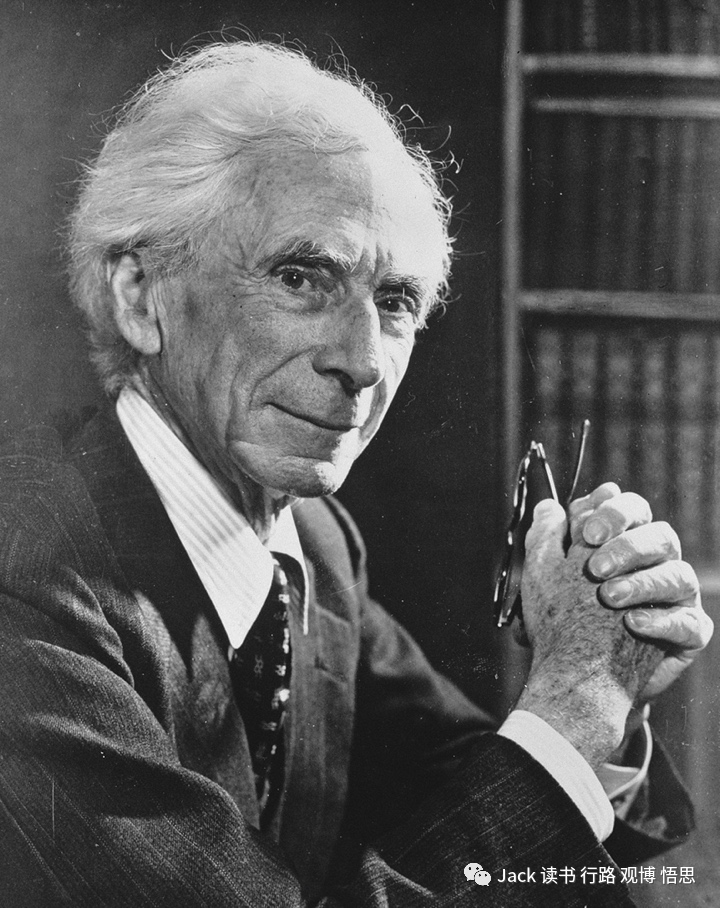
(Bertrand Russell)
According to the great English thinker Bertrand Russell, there are four basic desires of humankind, and each one of them, if unleashed, can lead to apocalyptic impacts. I will elaborate on three of the four desires in the following paragraphs.
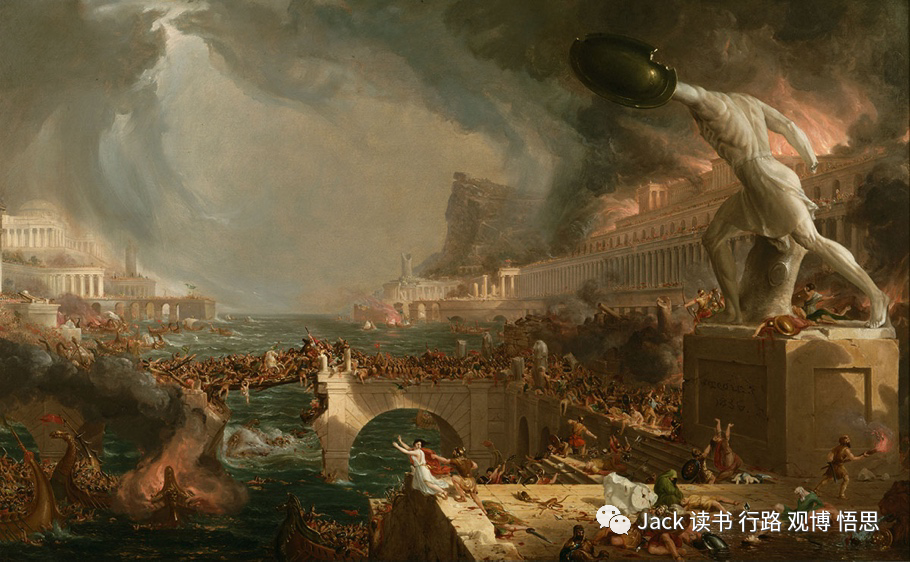
(The Visigoths sacking Rome)
The first kind of desire that Russell classified is “acquisitiveness”. “Acquisitiveness” can be defined as the greed for more resources and more land. A classic example in case is the pillage of the Western Roman Empire by the Germanic tribes from the North. In 476 C.E., the Germanic tribes sacked Rome and laid waste to the magnificent architecture and temples. The reason why this massive raid occurred can be attributed to the covet of the relatively barbaric tribes. After the "Third Century Crisis", the Western Roman Empire went into a severe decline. The tribes to the north saw an opportunity to loot virtually all the material treasures of the Romans and fulfill their “hunger”, so they came one by one and eventually altogether in the fifth century C.E. From this example, we can see how the acquisitiveness of humankind can cause a significant catastrophe. The demise of the Western Roman Empire directly led to the Middle Ages that brought serious impacts to history.

(Skulls from the Rwandan Genocide)
The second kind of desire that is quite significant is “rivalry”. The constant competition between different groups and different countries or political entities makes people want to completely ruin their rival. And what tends to happen with a growing rivalry is the birth of harmful biases and prejudices, to provoke nationalist or populist feelings among the populace. For example, the Rwandan Genocide can be stemmed from the growing rivalry between the Hutus and the Tutsis in the region. Rwanda was once colonized by the Belgians, and during the colonization period, the Europeans favored the minority Tutsi over the Hutu, sowing the seed for the tensions between those two ethnic groups. In 1990, Tutsi forces, coalescing into the Rwandese Patriotic Front ("RPF"), invaded Rwanda from Uganda, and the central government of Rwanda, mainly composed of Hutus, responded by ordering the massacring of Tutsi invaders in the hundreds. On April 6, 1994, a plane carrying Habyarimana and Burundi’s president was shot down over Kigali, the capital of Rwanda, with no survivors. This incident quickly led to mass killings in Kigali and other regions in the country. In the first two weeks of the genocide, local officers resisted it and protected the Tutsi. But after April 18, national officers started to punish and even kill local resisters. Officials rewarded Hutu killers with money, food, drink, and even drugs. Government-supported radios began calling ordinary Hutu Rwandans to do away with any of their Tutsi neighbors. Within three months, more than 800000 people were dead. In this example, the unhealthy rivalry between different ethnicities caused a horrific catastrophe. Throughout history, such detrimental competition has been common, whether it is the multiple prosecutions of Jews, or the bloody fight for hegemony on the seas between European powers during the Age of Discovery, or the Soviet-U.S. conflict during the Cold War, or the unpredictable Sino-U.S. struggle currently. These kinds of rivalries already led to or might lead to apocalyptic outcomes in the future.
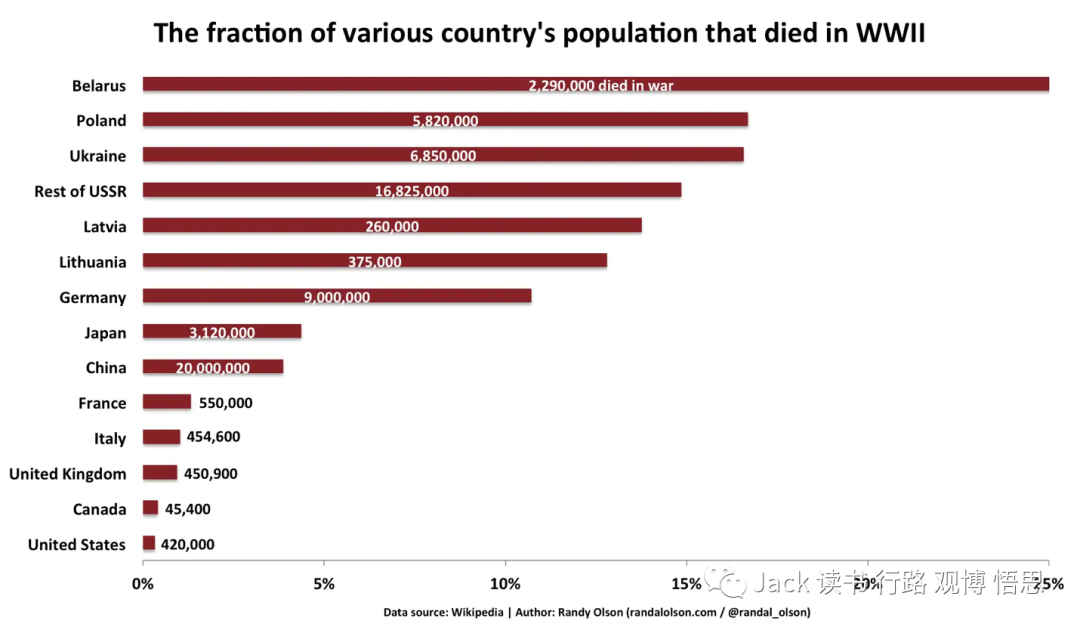

(Soldiers of the Khmer Rouge Regime in Cambodia)
The fourth type of desire classified by Russell is the one that I want to emphasize on, because it is usually the strongest and can cause the most catastrophic outcomes. That is the “love of power”. Just like what Lord Varys said in Game of Thrones, “power resides where men believe it resides. It’s a trick, a shadow on the wall. And a very small man can cast a very large shadow”. Throughout history, every leader, every politician cannot escape the attraction of power. World War II started on September 1st, 1939, with Germany, led by Adolf Hitler, directly invading neighboring Poland. Hitler was manically driven by his lust for total dominance over Europe and even other regions across the globe. Two days later, Britain and France declared war on Germany. Over the next six years, the Allied Powers, consisting of Britain, France, the U.S., and the U.S.S.R would fiercely combat Germany, Italy, and Japan, comprising the Axis Powers. Since World War II witnessed the utilization of more advanced weapons and the attending of more countries, its casualties are even more jaw-dropping. In 1945, after the War finally came to an end, at least 80 million lost their lives, and events during the war, such as the Holocaust, nearly completely wiped out certain groups of people. World War II is one of the most pertinent examples that can display the effects of the lust of power that almost encroaches on every political leader. During the Khmer Rouge Regime in Cambodia from 1975 to 1979, more than 2 million lives were lost due to government killing. The regime, under the Marxist leader Pol Pot, tried to build an agrarian utopia, but failed spectacularly. However, the cost of such a failure was extremely terrifying. To gain control of the of the country, the regime directed the massacring of thousands upon thousands of families and knowledgeable scholars, and turned schools, libraries, and other public spaces into prisons and places for torturing. The regime’s insatiable greed for more power caused a horrific massacre of knowledgeable talents that has shocked the world.
Overall, the record of human history brims over with the rage to destroy. Our brutality and lust for destruction have been enough to start wars, annihilate ethnicities and strangle civilizations. However, human nature is also imprinted with a quite opposite instinct. This instinct allows us to create spiritual civilizations that go beyond the demands of food and shelter. This kind of civilization is defined by imagination, care, art, and wise thoughts. In this dual nature, we must have hope for the future. It is exactly on destruction and the ruins, that human creativity dawns.
WORKS CITED
Andrews, Evan. "6 Infamous Sacks of Rome." History.com, 29 Aug. 2018,
www.history.com/news/6-infamous-sacks-of-rome.Accessed 28 June 2021.
History.com Editors. "Rwandan Genocide." History.com, 30 Sept. 2019,
www.history.com/topics/africa/rwandan-genocide.Accessed 28 June 2021.
Popova, Maria. "The Four Desires Driving All Human Behavior: Bertrand Russell's Magnificent Nobel Prize Acceptance Speech." Brainpickings.org, Maria Popova,www.brainpickings.org/2015/09/21/bertrand-russell-nobel-prize-acceptance-speech/.Accessed 28 June 2021.
Royde-Smith, John Graham and Hughes, Thomas A.. "World War II". Encyclopedia Britannica, 15 May. 2021, https://www.britannica.com/event/World-War-II. Accessed 28 June 2021.
Staff of the BBC. "Khmer Rouge: Cambodia's years of brutality." bbc.com, 16 Nov. 2018, www.bbc.com/news/world-asia-pacific-10684399. Accessed 19 Dec. 2020.
PICTURES FROM
https://en.wikipedia.org/wiki/Bertrand_Russell
https://www.historytoday.com/archive/months-past/visigoths-sack-rome
https://www.businessinsider.com/percentage-of-countries-who-died-during-wwii-2014-5
https://www.nytimes.com/2014/08/27/opinion/cambodia-shouldnt-censor-the-khmer-rouge-courts-files.html
在本系列的上几篇文章中,我们探讨了人性可以多么美好、富有创造力并能创造出壮观的文明成果。我们研究了伟大文明的兴衰,深入欣赏了祖先创造的精美艺术,思考了几千年前的文明如何以无数种方式相互交流启迪。然而,人类的本性不应该只被定义为善良的和富有想象创造力的。人类自身也应该理性地看到人性本身的阴暗面,例如贪得无厌,无法抑制的毁灭意愿,以及虚伪和对彼此的过度好斗。从我的观点来看,人性 "邪恶 "面的影响已经在历史上带来了许多灾难,我们不应该忽视它。“邪恶”的人性将在未来继续为世界的稳定与发展带来消极影响,甚至可能带来更多的恶果,如果我们不能想出必要的方法来应对与约束。
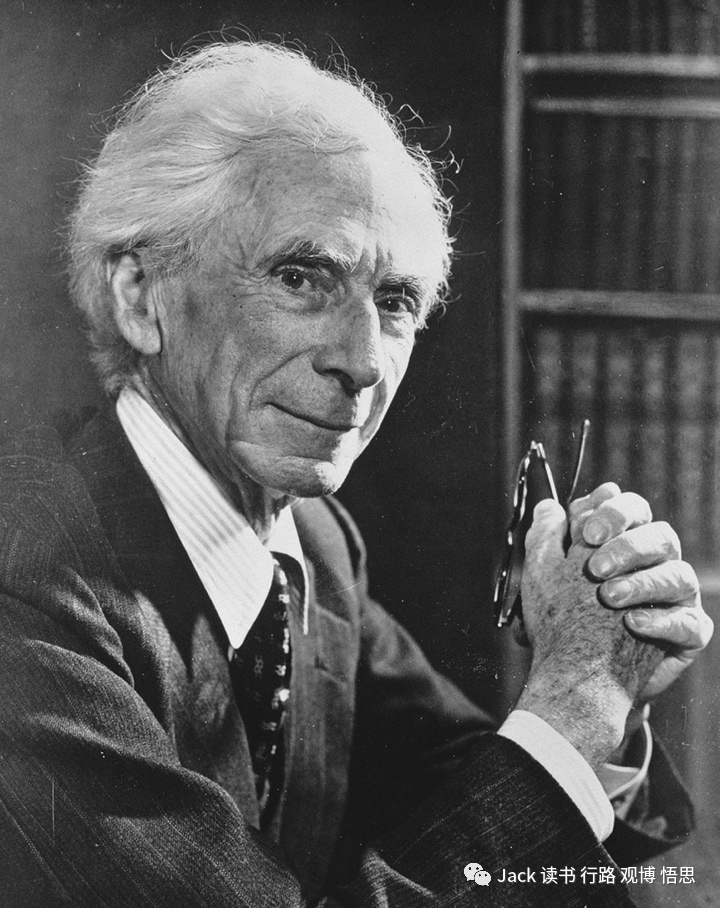
(伯特兰-罗素)
根据伟大的英国思想家伯特兰-罗素的观点,人类有四种基本的欲望,其中每一种欲望如果被释放,都会导致极其恶劣、具有灾难性的影响。下面,我将重点谈其中的三种欲望。

(西哥特人洗劫罗马)
罗素分类中的第一种欲望是 "占有欲"。"占有欲 "可以被定义为对更多资源或更多土地等物质财富的贪婪。一个典型的案例是来自北方的日耳曼部落对西罗马帝国的掠夺。公元476年,日耳曼部落洗劫了罗马,其恢弘的建筑和寺庙遭到了破坏。这次大规模突袭发生的原因,可以归结为日耳曼诸部落对于罗马帝国资源与财富的觊觎之心。“三世纪危机”之后,西罗马帝国陷入了严重的衰退。北方的部落看到了一个机会,可以掠夺罗马人几乎所有的物质财富,满足他们的 "饥饿感",所以他们一个接一个地来,最终在公元五世纪大举进攻。从这个例子中,我们可以看到人类的贪婪是如何造成重大灾难。西罗马帝国的灭亡直接导致了欧洲进入了近1000年的中世纪,对历史产生了深远影响。

(卢旺达大屠杀死尸的头骨)
第二种相当重要的欲望是 "竞争欲"。不同群体和不同国家或政治实体之间的不断竞争使人们通常想彻底毁掉他们的对手。而随着竞争的不断加剧,往往会产生有害的偏见,以激起民众的民族主义或民粹主义情绪。例如,卢旺达种族大屠杀事件可以说是源于该地区胡图族和图西族之间日益增长的竞争关系。卢旺达曾经是比利时人的殖民地。在殖民期间,欧洲人挑拨图西族与胡图族之间的矛盾,为两个民族之间的紧张关系埋下了种子。1990年,图西族部队凝聚成卢旺达爱国阵线(RPF),从乌干达入侵卢旺达,主要由胡图族组成的卢旺达中央政府作出回应,下令屠杀数百名图西族入侵者。1994年4月6日,一架载有卢旺达总统哈比亚利马纳和布隆迪总统的飞机在卢旺达首都基加利上空被击落,无人生还。这一事件迅速导致了基加利和该国其他地区的大规模屠杀。在种族灭绝的头两个星期,当地官员抵制种族灭绝,保护图西人。但在4月18日之后,国家官员开始惩罚,甚至杀害当地的抵抗者。官员们用金钱、食物、饮料、甚至毒品来奖励胡图族杀手。政府支持的广播电台开始呼吁普通的胡图族卢旺达人铲除任何一个图西族邻居。在三个月内,有80多万人死亡。在这个例子中,种族之间的不良竞争酿成了可怕的人类悲剧。这种不良的竞争在历史中数不胜数。历史中历次对犹太民族的迫害、大航海时代欧洲海上霸权的血腥争夺、冷战时期的美苏争霸,以及难以预测的未来中美争霸都已经或者可能给人类造成重大的灾难。
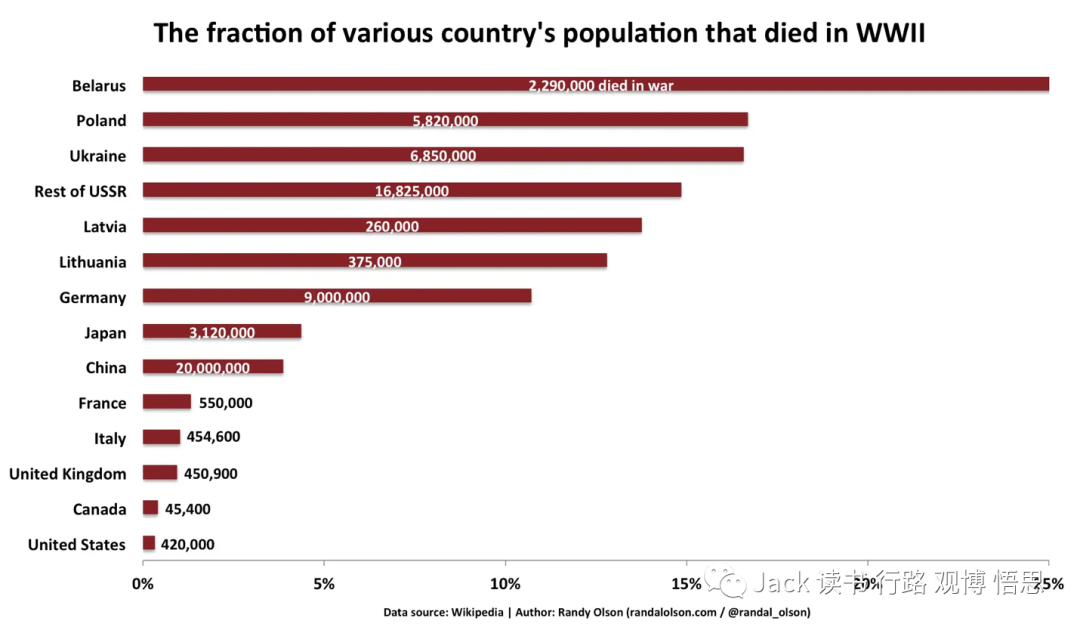

(红色高棉的士兵)
罗素所分类的第四种欲望是我想强调的,因为它通常是最强烈的,可以导致最灾难性的结果。那就是 "权力欲"。就像《权力的游戏》中瓦里斯大人所说的那样,“权力存在于人们认为它存在的地方。它是一种诡计,是墙上的阴影。而一个非常小的人可以投下一个非常大的阴影。”纵观历史,每一位领导人、每一位政治家都无法避免权利的蛊惑。第二次世界大战于1939年9月1日开始,由阿道夫-希特勒领导的德国直接入侵邻国波兰。希特勒被他想统治整个欧洲乃至世界其他角落的权力欲疯狂地驱使着。两天后,英国和法国向德国宣战。在接下来的六年里,由英国、法国、美国和苏联等所组成的盟国将与德国、意大利和日本这些轴心国进行激烈的斗争。由于第二次世界大战包括利用更多的先进武器和参加更多的国家,所以它的恐怖更加令人骇人听闻。1945年,战争最终结束后,至少有8000万人丧生,战争期间发生的事件,如犹太人大屠杀,几乎完全消灭了某些群体。二战是最贴切的例子之一,显示出了权力欲对于每一位政治家的影响,以及最终可以带来的严重结果。在1975年至1979年的柬埔寨红色高棉政权期间,有200多万人因政府杀戮而丧生。该政权在马克思主义领导人波尔布特的领导下,试图建立一个农业乌托邦,但却以失败而告终。然而,这种失败的代价是极其可怕的。为了获得对国家的控制,该政权指挥屠杀了成千上万的家庭和有知识的学者,并将学校、图书馆和其他公共场所变成了监狱和折磨人的地方。为了满足权力欲,红色高棉政权不惜牺牲上百万的优秀知识分子的生命作为代价,这也震惊了整个世界。
总的来说,人类的历史中满载着妄图毁灭一切的怒火,其无穷无尽的残暴与毁灭欲足以发动战争、灭绝种族、断绝文明。但同时,人性中也铭刻着一种截然相反的天性。这种天性使我们创造了温饱需求之外的精神文明,这种文明充满着想象力、关怀、艺术、与哲思。在这种两面性中,我们时刻要保持对于未来的希望。正是在一次次毁灭与废墟之上,人类创造力的黎明才被点燃。
- 本文标签: 原创
- 本文链接: http://www.jack-utopia.cn//article/436
- 版权声明: 本文由Jack原创发布,转载请遵循《署名-非商业性使用-相同方式共享 4.0 国际 (CC BY-NC-SA 4.0)》许可协议授权










